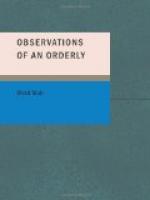It came to pass that eight complimentary tickets for a Queen’s Hall matinee were received by the Matron, who in due course allotted them to seven “D” Block patients. An orderly, detailed to take them to the hall, completed the octette. Corporal Smith, the orderly in question, recounted his adventures afterwards. “Never again,” quoth he, “shall I jump at a matinee job if there are blind chaps in the party. They’re the deuce.”
You must understand that we hospital orderlies regard the task of shepherding patients to an entertainment in town as an agreeable form of holiday. I have had some very pleasant outings of that sort myself. But not—I am thankful to recall, in the light of Corporal Smith’s narrative—with blind men. One-legged men are often a sufficient care, in manoeuvring on and off omnibuses. Apparently helpless cripples have a marvellous gift for losing themselves, entering wrong trains, and generally escaping—as the hour for return draws nigh—from one’s custody. And the city seems to be full of lunatics ready to supply alcohol or indigestible refreshments to the most delicate war-hospital inmates. Even with ordinary patients the orderly’s afternoon excursion is sometimes not unfraught with anxiety. But blind patients, as Corporal Smith said, are the deuce.
Out of his party, four were totally blind, two could recognise dimly the difference between light and darkness, and one had a single good eye.
Queen’s Hall was reached, by bus, without mishap. After the performance there was tea at an A.B.C. shop. Here Jock, one of the totally blind men, a Scotchman—all Scots are “Jocks” in the army—distinguished himself by facetiae (audible throughout the whole shop) on the English pronunciation of the word ‘scone,’ and intimated his desire to treat the company to a ballad. This project was suppressed, but “a silly fool in a top hat threatened to report me for having given my men drink,” said Corporal Smith. “Jock gave him the bird, not ’arf. But I thought it about time to be going home.”
So the party prepared to go home.
The bus was voted dull. Somebody suggested the tube. Corporal Smith consented.
He had forgotten that at Oxford Circus station the lifts have been abolished in favour of sliding staircases. Confronted by the escalator, Corporal Smith halted his party and informed them that they must walk down by the ordinary stair. The escalator was not safe for blind men. Unfortunately, Jock had sniffed a lark; the one-eyed man backed him up; the party—elated perhaps by their tea—would not hear of anything so humdrum as a descent by the ordinary stair. They were going on the sliding stair. They insisted. Corporal Smith argued in vain. In vain he exerted his (purely nominal) authority. His charges mocked him. The one-eyed man leading, with Jock in his wake, they launched themselves at the sliding stair. In sheer desperation Corporal Smith brought up the rear, supporting two of the more timid venturers as best he might. None of the group except Corporal Smith himself, as it turned out, had ever travelled on an escalator before. But they had heard a comic song about a sliding stair, and they wished—Jock especially—to sample this metropolitan invention.




